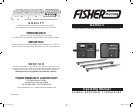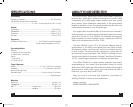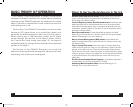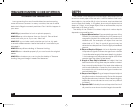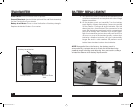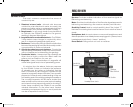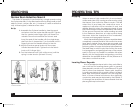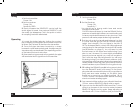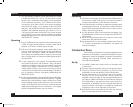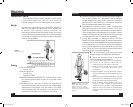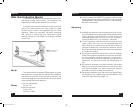
11
SEARCHING
5. For even more accurate pinpointing of short objects,
(i.e., a pipe, cable, etc.) approach the test object
at right angles from your previous direction. Mark the
ground as you did before. Your test object should be
about centered between four marks.
6.
To establish the path of a pipe, cable, or other long
conductor, pinpoint two more locations 15-20 feet
apart. From these three locations you should be able to
draw a straight line (unless the pipe isn’t straight). Careful
additional locations may be necessary if no prints (maps
of underground lines) of the area are available.
7. It may be necessary to reduce sensitivity with the
SENSITIVITY knob when the pipe or cable is large and/
or shallow. If the meter needle has peaked and sound
is at a high level, you will want to bring the sensitivity
down to see the peak of the needle at a point less
than 100 as you move in half or quarter steps back
and forth to get your peak reading.
8. If at all possible, practice over some
buried targets of known size and depth.
9. There are several things to consider
when locating buried objects:
a. Precise location depends on operator skill.
b. Position of the ground marks does not
indicate size of the object or its path.
c. More than one metal object may cause
a wider or stronger response than
expected.
d. Deeper targets may not produce a signal
until the operator has passed directly over
them.
e. Reducing the receiver SENSITIVITY control
will narrow the area between the ground
marks for more precise pinpointing.
f. Small or deeply buried objects such as a
cache of coins, require a tight, closely
traversed search pattern. Large or shallow
objects can be located successfully with
a larger, more widely traversed search
pattern.
Figure 6. Handle strap: Using
the handle strap increases
depth; however, it may be
difcult to tune the GEMINI-3
this close to highly mineralized
ground.
14
TRACING
Inductive Trace
The Inductive Trace mode is usually used to trace
a long object (pipe, ore vein, etc.) that shows no
exposed portions, but two starting points are known.
Set Up
Locate two points along the conductive object at
least 30 feet apart as described in the Wide Scan
or Narrow Scan Inductive Search sections. The
transmitter and receiver should be in line with each
other, both facing the same direction. The transmitter
should be on the ground and the receiver should be
held by the operator.
Tuning
1. Set the transmitter:
Power: ON
2. Set the receiver:
Power: ON
Sensitivity: ZERO
3. Increase the receiver SENSITIVITY control until you have
an audio response and at least a mid-scale meter
deection.
4. Determine that you are not direct air coupling by
moving the receiver back and forth. The audio meter
indications should peak over the object. No peak
will be observed if the receiver is too close to the
transmitter and direct air coupling is occurring.
Figure 8.
Inductive Trace
Gemini-3manual-.ind2 11 6/13/06 2:52:52 PM



